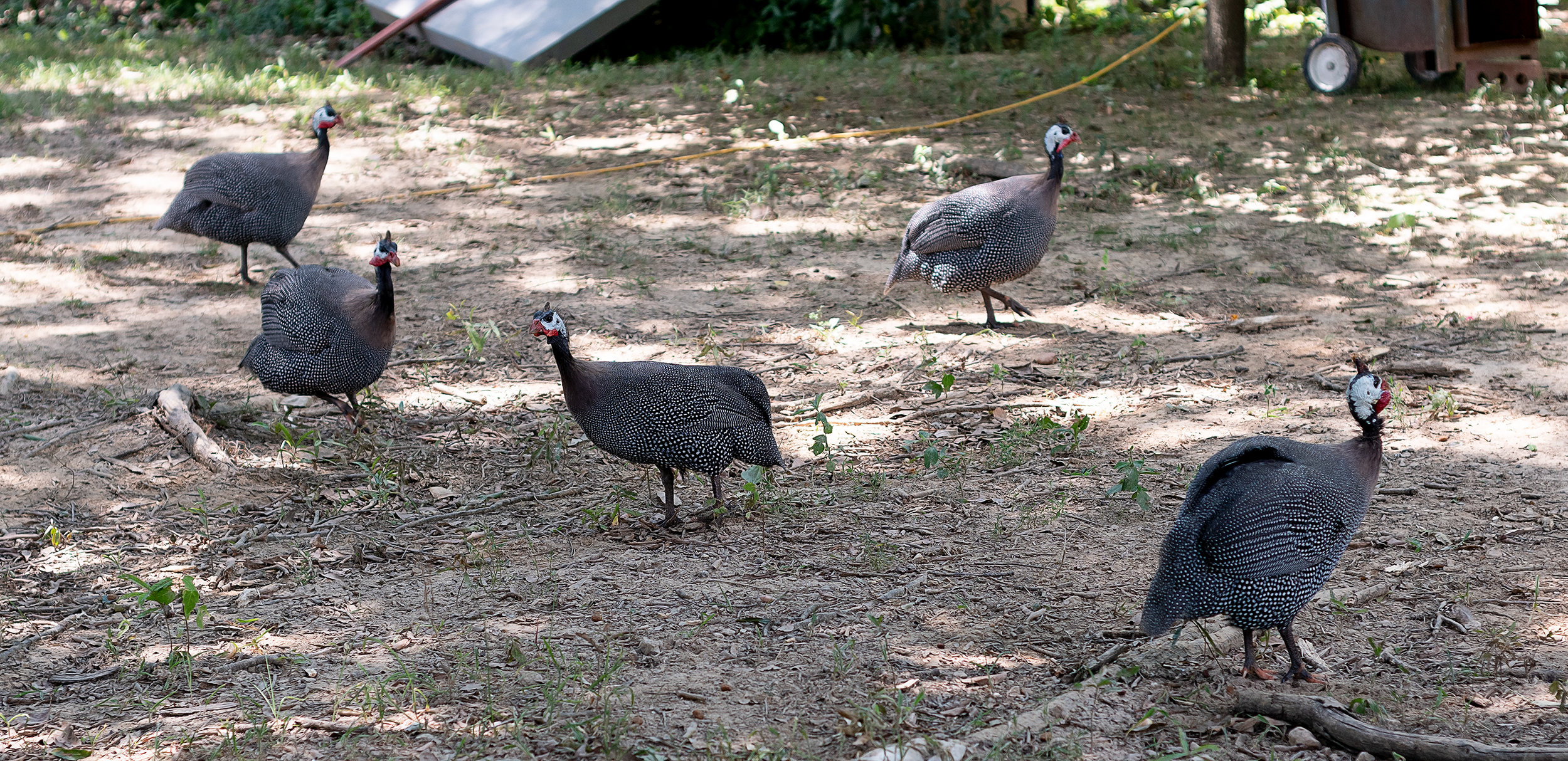Guineas, They're not Pigs!
What’s something unexpected that you can find on Drummonds Road? Guineas! These fascinating fowl are normally found in Africa, but the Bomars have been raising them on and off in Drummonds for years!
Mr. Bobby Bomar remembers his family having guineas when he was a kid between 1932 and ‘37, but it wasn’t until he was older that he got back into raising the birds. He recounted that, “a friend gave me some white ones and then another friend up at Cypress Inn, Tennessee gave me the gray ones that I have now. I was up there riding horses and I’d given him a coon dog. I went to his house and he had a chicken hen and 21 baby guineas, keets, all in a box. I brought them home and I’ve had guineas ever since then.”
Mr. Bobby was happy to sit down with us and explain everything about his guineafowl, or, as he told us, “I just call them guineas.”
Guineas are related to other game birds such as pheasants, turkeys, and partridges, but guineas are “not a very domestic bird.” Mr. Bobby went on to convey, “they’re wild and they stay wild. Even though you pen them up, feed them, take care of them, they’re still just as wild as they can be.” As a matter of fact, guineas will fight other wild animals such as foxes, coyotes, and snakes. A snake, in particular, Mr. Bobby brought up, “they’ll just attack it. One from one direction, then it’ll jump back and one from the other direction will get after it. They’ll kill ‘em ‘cause he can’t get up off the ground.”
Guineas are not the type of bird you can make a pet out of, but Mr. Bobby likes having them anyway. They fly up and roost in a 45-year-old tree in his backyard, “They’re just a farm bird. “I have peacocks, chickens, horses and the guineas.” Like his peacocks, “they don’t want to be touched.” Guineas are excellent for pest control because they, “like to catch anything that moves. They run all the time catching horseflies that are around the horses. They eat quite a bit of grass, but prefer insects.”
Guineas stay near where they’re raised but can roam up to a quarter of a mile in any direction. This means Mr. Bobby has to go out and search for the eggs his fowl lay. His guineas actually only go out about 100 yards away from his house, in the woods surrounding his property. He informed us that five or six hens can lay 40 or 50 eggs in one nest, “when they start to sit on them, it’s not unusual to see two or three of them trying to sit on the nest. That causes them to move the eggs around, out from under each other. Then sometimes some of the eggs won’t be covered.” When he finds the viable eggs, he’ll bring them in and incubate them until they’re about eight-weeks-old, “they’ll be able to keep up then and be good. You won’t have to worry about them. They’ll make their own living.”
Mr. Bobby’s house is set pretty close to Drummonds Road. “They get in the road. Seven or eight times a day they’ll go across that road and I’ve had three killed this year, but the majority of the time people will slow down enough to let them go.” Mr. Bobby continued informing us that “they’re quick, if a car gets close enough to them, even if they have to go straight up in the air and let the car go under them; they’ll get away.”
Mr. Bobby thinks that guineas are a good farm bird, even though they’re not tame. He likes keeping them along with his peacocks, chickens, and horses. Mr. Bobby and his wife, Mrs. Peggy, enjoy sitting in their front room and watching their guineas roam around their property. It’s easy to tell that the Bomar’s really enjoy keeping guineas. They’re both a wealth of information when it comes to the birds and how to raise them. Mr. Bobby mentioned just before we left that, “I don’t keep them for any special purpose I just have them.”
Mr. Bobby also showed us a very interesting piece of Tipton County history while we were talking about his guineas. Check out our blog on it: https://www.cypressmag.com/blog/2018/8/31/1937-the-tipton-county-fair.





